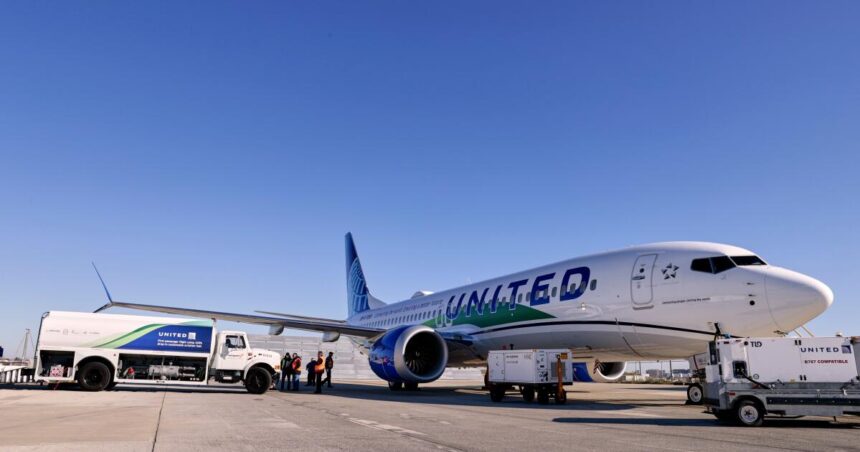Jet airplanes spew enormous amounts of greenhouse gases and noxious chemicals, but the industry insists it wants to clean itself up.
Some of the largest commercial airlines and airborne cargo carriers in the U.S. have banded together to help solve the problem under their trade group Airlines for America. On Wednesday, the group announced a partnership with the California Air Resources Board to set policy to pave the way for wide adoption of sustainable aviation fuels, or SAFs.
Those fuels today are based on food waste and farm crops, although alternatives including hydrogen lie on the horizon. United Airlines started using some SAF in 2015. But SAFs’ share of the market is tiny, and they’re two to three times as expensive as jet fuel — basically kerosene — from refined oil.
Biofuels also draw criticism from many environmentalists because their supply chain still contributes carbon to the atmosphere, and much of what’s burned today is a mix of SAF and fossil jet fuel. And, they say, land used to grow corn and other fuel ingredients could be put to better use.
CARB and the airlines will “work together with sustainable aviation fuel producers, aviation stakeholders, and the federal government to ensure that at least 200 million gallons of cost-competitive options are available for use by airlines within California by 2035,” the air board said in a press release. “A Sustainable Aviation Fuel Working Group of government and industry stakeholders” will be created.
The major focus will be on state and federal financial incentives and permit reform.
The plan was announced at a news conference at San Francisco International Airport on Wednesday. CARB Chair Liane Randolph said that “California is once again demonstrating that smart climate action is good for the environment and good for business.”
“This partnership with the nation’s leading airlines brings the aviation industry onboard to advance a clean air future and will help accelerate development of sustainable fuel options and promote cleaner air travel within the state,” she said.
The 200 million gallons “seems like a pretty modest goal to me,” said Aaron Smith, an agriculture and resources economist at UC Berkeley.
The federal government is aiming to create a supply of 3 billion gallons by 2030, which most industry observers consider an aggressive target.
The passenger airlines and cargo carriers working with the state are Alaska Airlines, American Airlines, Atlas Air Worldwide, Delta Air Lines, FedEx, Hawaiian Airlines, JetBlue Airways, Southwest Airlines, United Airlines, UPS and Air Canada.










